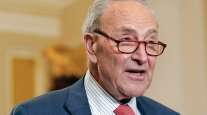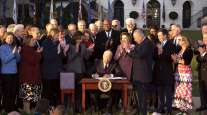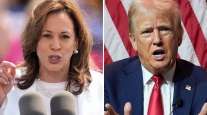Senior Reporter
Harris Sticking With ‘Build Back Better’ Agenda for Campaign
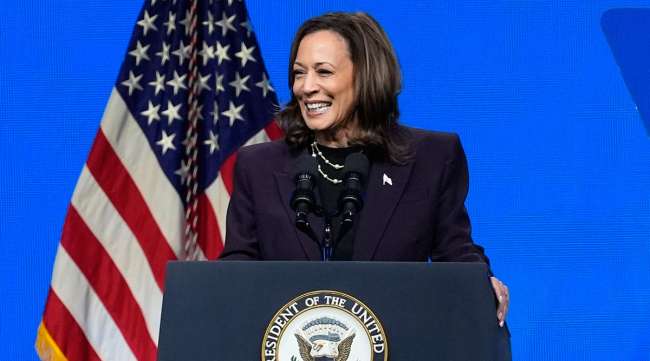
[Stay on top of transportation news: Get TTNews in your inbox.]
With her spot atop the Democratic presidential ticket seemingly assured, Vice President Kamala Harris has committed to continue pursuing policies the current administration initiated three years ago should she win the November election.
After President Joe Biden’s withdrawal from the election earlier this month, Harris quickly rose to become her party’s favored candidate. She will face off against former President Donald Trump for control of the White House.
If elected, Harris said she would continue implementing multiyear laws focused on climate change and infrastructure, a “Build Back Better” policy dossier that anchors the current president’s “Bidenomics” agenda. For example, a Harris White House would be expected to negotiate with Congress the terms of a new multiyear surface transportation bill as well as measures linked to emerging technologies, rail and pipeline safety and cyclical water infrastructure legislation.
Top congressional Democrats from New York — House Minority Leader Hakeem Jeffries and Senate Majority Leader Chuck Schumer — recently announced their support for Harris.
“The work is not done,” Schumer said July 23. “This is not a moment of culmination, because we have a lot of work left to do. For everything that has transpired these past few weeks, one thing has not changed: Senate Democrats will continue working with President Biden, with Vice President Harris, and with the entire Biden-Harris administration to make life better for the American people.”
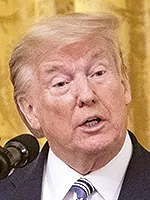
Trump
Harris has been quick to tout Biden’s tenure and echoes his vision of a transformative landscape for towns and communities across the nation.
“Joe Biden is a leader with bold vision. He cares about the future. He thinks about the future. He has extraordinary determination and profound compassion for the people of our country. And I say that because I know that we are all deeply, deeply grateful for his service to our nation,” she told supporters in Indiana on July 24.
Later on during her address, she added: “Ours is a vision of a future in which we realize the promise of America. And I deeply believe in the promise of America: a promise of freedom, opportunity and justice not for some but for all.”
Jeff Loftus of FMCSA joins TT’s Seth Clevenger to discuss the current outlook on ADAS technology and how it will affect the industry at large. Tune in above or by going to RoadSigns.ttnews.com.
In addition to endorsing all-things Bidenomics and at times serving as a deciding vote in the U.S. Senate, Harris’ role as vice president included overseeing efforts to improve access to voting, addressing circumstances surrounding illegal immigration and championing reproductive rights.
On the campaign trail, the vice president’s primary role is expected to center on fundraising and pushing forward with a referendum on Trump’s candidacy. A singular focus for the Democratic candidate appears to be placed on reproductive rights. It is unclear how prominently infrastructure policy will be debated among the presidential candidates.
During an Oval Office speech July 24, Biden recounted “Build Back Better” domestic policy achievements as he announced his withdrawal from the presidential race. As he put it, “We have the strongest economy in the world, creating nearly 16 million new jobs — a record. Wages are up, inflation continues to come down, the racial wealth gap is the lowest it’s been in 20 years.”
Biden went on: “We’re literally rebuilding our entire nation — urban, suburban, rural and tribal communities. Manufacturing has come back to America.”
Biden enacted the $1.2 trillion Infrastructure Investment and Jobs Act on Nov. 15, 2021. The bipartisan infrastructure law, considered a road map for modernizing the country’s transportation landscape, has provided billions of dollars for improving freight connectivity and enhancing safety along commuter corridors.
Since its enactment, the infrastructure law has been cited in nearly every congressional district. Earlier this month, the Transportation Department announced more than $5 billion to upgrade bridges. Secretary Pete Buttigieg, a Harris supporter, credited the administration for the funding.
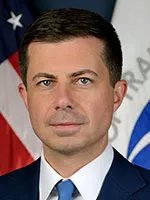
Buttigieg
“For too long America let bridges fall into disrepair, which left people less safe, disrupted our supply chains and cost people time and money — but now the Biden-Harris administration is changing that with the biggest investment in our bridges since the [President Dwight D.] Eisenhower era,” Buttigieg said July 17.
“There are currently about 3,000 fewer bridges in poor condition than when our administration began,” the secretary continued, “and today we are proud to announce funding to repair or replace 13 of America’s largest and economically significant bridges.”
Buttigieg has been rumored by Washington’s political class as a viable choice to join Harris’ presidential ticket. The short list for the vice president role also includes Pennsylvania Gov. Josh Shapiro (D) and Arizona Sen. Mark Kelly (D). Shapiro was recently joined by Buttigieg for a tour of the state’s new infrastructure projects. Kelly is a prominent member of the chamber’s committee on highway policy.

Vance
Harris and her campaign are targeting Trump and his vice presidential selection, Ohio Sen. J.D. Vance (R), for a conservative manifesto primarily authored by former Trump administration officials. The “Project 2025” policy declaration, prepared by The Heritage Foundation, proposes various federal transportation policy updates, such as re-evaluating emissions reduction programs specific to the freight sector.
Harris, formerly U.S. senator from California, sought the presidency during the last presidential cycle. While in the Senate, Harris endorsed funding for programs specific to severe-weather infrastructure resilience as well as the electrification of surface transportation networks.
Want more news? Listen to today's daily briefing below or go here for more info:



